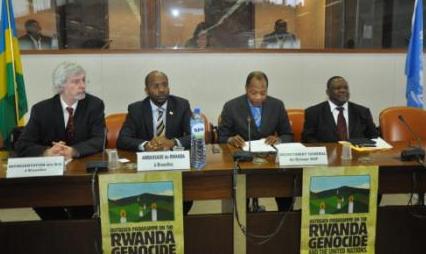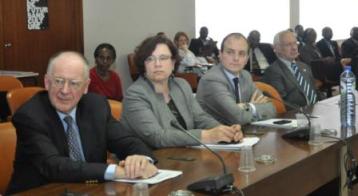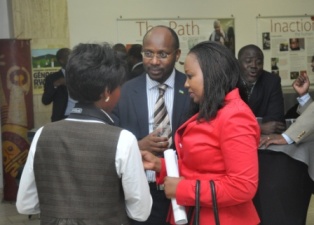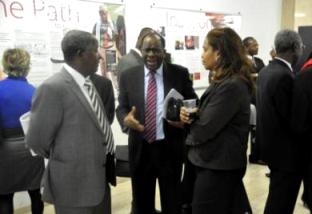UN, ACP, Rwandan Embassy mark genocide memory with joint ceremony
 Brussels, 5 May 2012/ ACP: A commemoration to honour the estimated 800,000 to 1 million lives lost at the hands of genocidaires in Rwanda in 1994 was jointly held by the ACP Secretariat, the United Nations, and the Rwandan Embassy on Monday 30 April at the ACP House.
Brussels, 5 May 2012/ ACP: A commemoration to honour the estimated 800,000 to 1 million lives lost at the hands of genocidaires in Rwanda in 1994 was jointly held by the ACP Secretariat, the United Nations, and the Rwandan Embassy on Monday 30 April at the ACP House.
It wasthe firstRwanda genocide memorial co-organised by the United Nations in Belgium, and the first joint event amongst the three organisations.
Speaking to international representatives and members of the Brussels Rwandan community, the Ambassador of Rwanda to the European Union H.E Robert Masozera recalled how, only 18 years ago, Tutsi men, women and children, were systematically hunted down and murdered, along with non-Tutsi who tried to help them. The massacre lasted from April to July 1994, yielding 800,000 to 1 million deaths before the international community stepped in.
“The genocide against the Tutsi is a crime against humanity, etched in history as the last genocide of the 20th century,” he told the audience.
Ambassador Masozera condemned acts of negation or revision which may be used to deny the genocide happened. He called on the United Nations and the international community to be more alert to warning signs and more readily equipped to react to such situations.
United Nations representative in BrusselsJean Luc Onkelinx read out a message from the UN Secretary General Ban Ki Moon, stressing the “collective obligation” of preventing genocide.
Under the theme “Learning from history to shape a bright future”, Onckelinx added that the best way to help countries recover from crises is to achieve the Millennium Development Goals. He highlighted the need for upcoming generations to understand what happened in Rwanda and to remain vigilant against its reoccurrence. 
In support, the Secretary General of the 79-member ACP Group of States, Dr Mohamed Ibn Chambas stressed a message of peace:
“We have to understand that anyone who harbours hatred against others on account of their race, belief or creed is, in my opinion, a potential genocidaire. We have to therefore take bold action in tackling the root causes of violence and genocide, in particular, hatred, intolerance, racism and tyranny, which constitute fertile ground for genocides and other widespread human rights violations.”
Commending the progress made by Rwanda since the traumatic events of 1994, he added: “Despite such an undeniable and painful past, the nation of Rwanda looks forward with hope and ambition. In the past decade, the Rwandan community is among the fastest growing among the so-called ‘African Lions’, growing by an impressive 7% each year while remarkably more than a million people have been lifted out of poverty.”
Monday’s ceremony included the screening of the documentary Au nom du père de tous et du ciel, readings of testimonials written by genocide survivors’, taken from the Book of Life compiled by Odile Gakine Katese, and the launch of a special poster exhibition by the UN.
Dignitaries in attendance included the Ambassadors from Bangladesh, Barbados, Benin, Colombia, Ethiopia, Kenya, Nigerand Togo, amongst others.
The UN exhibition will be displayed at the ACP House until Thursday 10 May.
(Pictured (from top): UN representative Jean Luc Onkelinx, Rwandan Ambassador HE Robert Masozera, ACP Secretary General HE Dr Mohamed Ibn Chambas andACP Chef de Cabinet Dr Obadiah Mailafia leading the ceremony; Some of the guests at thecomemmorationevent; Rwandan Ambassador Masozera,Mme Masozerameet with guests; Ambassadors from Kenya and Barbados discuss exhibition.)
– ACP Press
